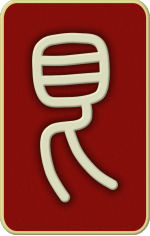
艮 Gèn Stillness (Immobility) [hexagram 52]

 Earth element
Earth element
Lunar month: 10 ; Host (controlling) line : 6
The Decision
Staying still lying on your back; no longer feeling your body; walking in the garden and seeing no-one. No blame.
Resting when time to rest, acting when time to act. When the time is appropriate this is wise. Resting in stillness is the proper place. Upper and lower correspond to each other without interacting and so lack consciousness of others: ‘Walking in the garden and seeing no-one. No blame’.
艮: 艮其背, 不获其身, 行其庭, 不见其人, 无咎. Gěn: gěn qí bèi, bù huò qí shēn, xíng qí tíng, bù jiàn qí rén, wú jiù.
彖传: 艮, 止也. 时止则止, 时行则行, 动静不失其时, 其道光明. 艮其止, 止其所也. 上下敌应, 不相与也. 是以不获其身, 行其庭不见其人, 无咎也. Tuàn zhuàn: Gèn, zhǐ yě. Shí zhǐ zé zhǐ, shí xíng zé xíng, dòng jìng bù shī qí shí, qí dào guāng míng. Gèn qí zhǐ, zhǐ qí suǒ yě. Shàng xià dí yìng, bù xiāng yù yě. Shì yǐ bù huò qí shēn, xíng qí tíng bù jiàn qí rén, wú jiù yě.
The Image
Mountains on top of each other form ‘Stillness’. The wise accordingly do not consider things outside their responsibility.
象传: 兼山, 艮; 君子以思不出其位. Xiàng zhuàn: Jiān shān, gěn; jūn zǐ yǐ sī bù chū qí wèi.
Line Change 1
Stillness of the toes. No fault. Worth remaining steadfast.
‘Stillness of the toes’ – not losing that which is correct.
初六: 艮其趾, 无咎, 利永贞. Chū liù: gěn qí zhǐ, wú jiù, lì yǒng zhēn.
象传: 艮其趾, 未失正也. Xiàng zhuàn: Gěn qí zhǐ, wèi shī zhèng yě.
Line Change 2
Stillness of the legs. Unable to help those higher up and so discontentment.
‘Unable to help those higher up’ – unresponsive to them.
六二: 艮其腓, 不拯其随, 其心不快. Liù èr: gěn qí féi, bù zhěng qí suí, qí xīn bù kuài.
象传: 不拯其随, 未退听也. Xiàng zhuàn: Bù zhěng qí suí, wèi tuì tīng yě.
Line Change 3
Stillness at the waist, separated from the lower body. There is some danger and the heart races.
‘Stillness at the waist’ – the danger affects the heart.
九三: 艮其限, 列其夤, 厉熏心. Jiǔ sān: gěn qí xiàn, liè qí yín, lì xūn xīn.
象传: 艮其限, 危熏心也. Xiàng zhuàn: Gěn qí xiàn, wēi xūn xīn yě.
Line Change 4
Stillness of the torso. No problem.
‘Stillness of the torso’ – ignoring agitation.
六四: 艮其身, 无咎. Liù sì: gěn qí shēn, wú jiù.
象传: 艮其身, 止诸躬也. Xiàng zhuàn: Gěn qí shēn, zhǐ zhū gōng yě.
Line Change 5
Stillness of the mouth, words are carefully considered. Regrets disappear.
‘Stillness of the mouth’ – there is harmony at the center.
六五: 艮其辅, 言有序, 悔亡. Liù wǔ: gěn qí fǔ, yán yǒu xù, huǐ wáng.
艮其辅, 以中正也. Gěn qí fǔ, yǐ zhōng zhèng yě.
Line Change 6
Genuine stillness. Good fortune.
Good fortune from remaining calm, honest and sincere – this is the way to virtue.
上九: 敦艮, 吉. Shàng jiǔ: dūn gěn, jí.
象传: 敦艮之吉, 以厚终也. Xiàng zhuàn: Dūn gěn zhī jí, yǐ hòu zhōng yě.
The full set of 64 English translations is available in our new book 'Book of Changes - Deciphered' ➚.